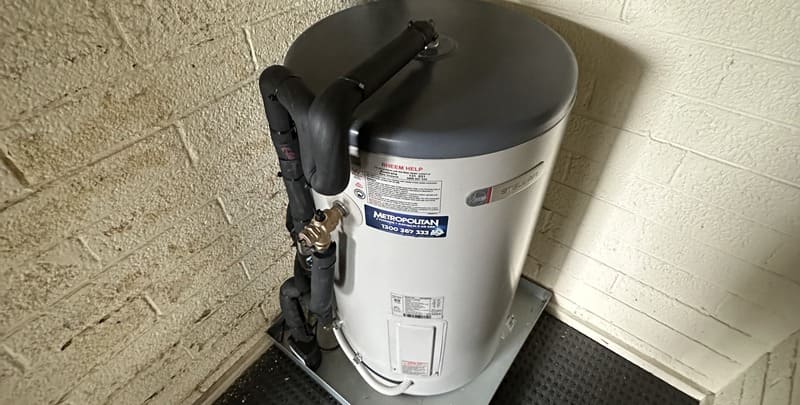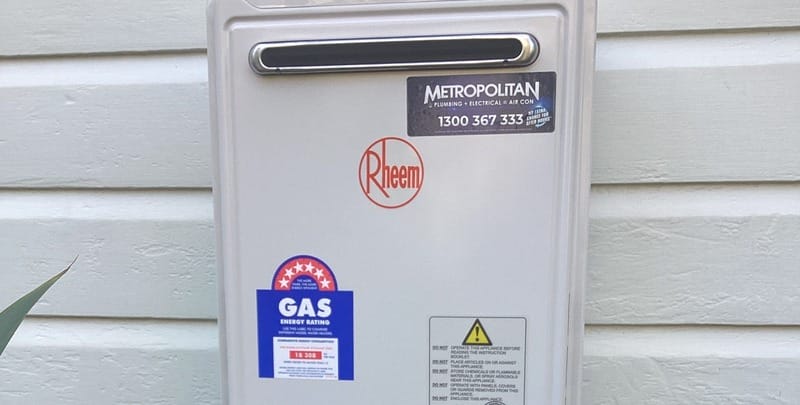
Electric Hot Water vs Gas Hot Water
The struggle between electric and gas systems is a hot topic in hot water conversations. So, let’s break down the differences and solve the puzzle.
Sit tight, everyone. We’re going head-to-head: electric hot water heater vs gas system.
The Ins and Outs of Electric Hot Water
Before we delve deeper into the comparison between electric and gas hot water systems, it is imperative that we build a strong foundation of understanding of the former.
An electric hot water system is quite simple. It uses an electric element to heat water, stored within an insulated tank.
The electric element works much like a kettle, just on a larger scale. Electric hot water system variations include the modern electric systems – storage tank systems and electric heat pump systems. But what are the virtues and vices of these systems?
Pros of Electric Hot Water Systems
Electric hot water systems, with their ease of use and simple installation, bring a host of advantages to the table. From affordability to environmental considerations, let’s discuss the benefits these instantaneous hot water systems offer.
- Ease of Installation: One of the primary advantages of electric hot water systems is their straightforward installation process. Unlike gas systems, you don’t require a gas line – just an electrical connection, making them particularly suitable for properties without existing gas connections.
- Lower upfront costs: Compared to gas or solar systems, electric hot water systems are relatively cheaper to purchase and install. The lower initial investment is a significant factor for many homeowners.
- Off-peak electricity usage: Electric hot water units can operate effectively using off-peak electricity tariffs. This capability can help to reduce your energy bills, especially if your electric water heater system includes a large storage tank and you can heat the water overnight.
- Environmentally friendly option − heat pumps: With people becoming more conscious of their environmental footprint, electric heat pump systems have emerged as a popular choice. They absorb heat from the environment, using less electricity than conventional electric systems, and thus reducing carbon emissions.

Cons of Electric Hot Water Systems
While electric hot water systems have their perks, they come with drawbacks as well. Factors like higher running costs and dependency on electricity cannot be overlooked.
Let’s understand these disadvantages in more detail.
- Higher running costs: Despite the lower upfront costs, the overall running costs of electric hot water systems can be relatively high. High electricity tariffs can lead to increased expenses, especially in households with high hot water consumption.
- Dependent on electricity supply: Electric hot water systems are reliant on a steady power supply. During power outages, systems that rely solely on electricity might leave you without hot water.
- Likely increase in off-peak electricity costs: Maintaining a heated water supply overnight using off-peak tariffs can sometimes be more expensive than expected. This is because when heating a large volume of water, the heater needs to operate for longer, and any hot water that is not used is still paid for, as it cools down before being reheated.
- Environmental concerns: Apart from heat pump systems, conventional electric hot water systems are not the most environmentally friendly option. They contribute to high carbon emissions, particularly if electricity is derived from non-renewable sources.
By considering the pros and cons of your new hot water system, you can evaluate whether an electric hot water system offers the best solution for your specific needs and circumstances.
A Detailed Look at Gas Hot Water Systems
Redirecting our attention to the alternate option in this head-to-head analysis, we set our sights on the intricacies and nuances of the gas hot water system.
Generally, gas hot water systems source their heat from natural gas or propane. A gas burner is used to heat the water in the storage tank. Variations include gas storage tank systems and gas continuous flow systems.
Pros of Gas Hot Water Heaters
Gas hot water heaters are praised for their quick heating ability and operation during power outages. They also contribute less to greenhouse emissions.
Before diving deep into exploring these advantages of the gas hot water heater itself, let’s briefly outline what they mean for consumers.
- Quick heating: Gas hot water heaters are known for their speed. They heat water faster than electric systems, which can be beneficial for large households where demand is high.
- Operability during power outages: Unlike electric heaters, gas water heaters can operate without electricity, ensuring a hot water supply even during power cuts.
- Lower greenhouse gas emissions: Compared to their electric counterparts, gas systems contribute to less greenhouse gas emissions. This might be a deciding factor if you’re environmentally conscious.
- Cost-efficiency: Gas is often cheaper than electricity, so running a gas hot water heater can save you money in the long run, especially if you have a high hot water demand.
- Longer lifespan: Gas hot water heaters tend to have a longer lifespan compared to electric ones, providing you with a reliable source of hot water for years to come.
Gas hot water heaters offer cost savings, quick heating, energy efficiency, reliability during blackouts, and durability – making them a compelling choice for many households.

The Cons of Gas Water Heaters
Despite their strengths, gas hot water heaters carry some downsides worth considering. With potential safety risks and comparatively higher upfront costs, there’s more to the picture than just quick heating.
Read on as we unpack the negatives associated with gas hot water heaters.
- High initial costs: Gas water heaters are mostly more costly to purchase and install than electric water heaters. This might affect your decision if you’re looking for an economical upfront solution.
- Potential safety risks: Gas hot water systems carry the potential risk of carbon monoxide leakage. While this is rare with modern, well-maintained units, it’s a factor to keep in mind.
- Need for ventilation: Gas heaters require proper ventilation to expel combustion gases safely. This means you’ll need to install vents or flues, adding to the installation complexity and cost.
- Limited placement options: Gas heaters must be placed near a gas line, limiting where you can install them in your home. Electric heaters are more versatile in this regard.
In summary, gas hot water heaters come with their own set of advantages and disadvantages. While they provide quick heating and are operable during power outages, they also come with higher initial costs and potential safety risks.
Solar Hot Water: A Bright Alternative
Solar hot water systems, a potentially advantageous contestant, should not be overlooked. They make use of the sun’s free and renewable energy to heat water, storing it in an insulated tank for use throughout the day and night.
The main advantage of a solar hot water system is its potential to reduce energy bills considerably. Lower greenhouse gas emissions are also a critical benefit associated with solar power systems.
However, these benefits come with a higher initial cost for both the system and installation. Some homes may not be suitable due to a lack of appropriate sun exposure, and in times of sparse sunlight, a gas or electric backup may be necessary.
Making the Choice
Despite the light-hearted comparison between electric and gas systems, it’s important to remember that both are tried-and-tested methods for providing dependable hot water solutions.
There’s no clear-cut victor or vanquished here. Neither holds the unequivocal title of being universally “superior”. The choice really boils down to your circumstances.
Delve into your personal household needs and weigh the pros and cons specific to each system. Most crucially, seek advice from an experienced professional who can guide you in making an informed decision about the most suitable hot water system for your abode.
Whether it’s concerning comfort or cost-effectiveness when it comes to hot water, you need not make any concessions − and with expert input, you’ll certainly not be required to.
Please note: This information is provided for advice purposes only. Regulations differ from state to state, so please consult your local authorities or an industry professional before proceeding with any work. See our Terms & Conditions here.
Published: 6 Feb, 2024